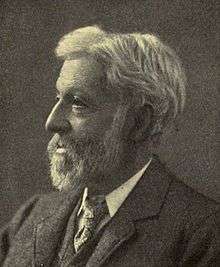Felix Moscheles
Felix Stone Moscheles (8 February 1833 – 22 December 1917) was an English painter, peace activist and advocate of Esperanto.

Biography
Born in London, Felix Moscheles was the son of the well-known pianist and music teacher Ignaz Moscheles and husband of the painter Margaret Moscheles. His godfather, after whom he was named, was the composer Felix Mendelssohn.
In the 1840s Mendelssohn founded Leipzig Conservatory and Moscheles' father took on a teaching post there. Felix attended the St. Thomas School and went on to study art. His paintings were exhibited in Paris, Antwerp and London.
In 1903 Felix Moscheles became the first president of the London Esperanto club. He was a pacifist and internationalist, and as such also served as president of the International Arbitration and Peace Association. He was involved in attempts to develop international dispute resolution protocols at the Hague.[1]
Publications
- "Patriotism as an Incentive to Warfare" (1870; Wertheimer, London)[2]
- In Bohemia with Du Maurier. The first of a series of reminiscences. With 63 original drawings by G. Du Maurier, illustrating the artist's life in the fifties (1896; T. F. Unwin, London)[3]
- Fragments of an Autobiography (1899; James Nisbet, London)[4]
Notes
- Sandi E. Cooper, Patriotic pacifism: waging war on war in Europe, 1815-1914, Oxford University Press, 1991, p.103
- "Patriotism as an Incentive to Warfare" (March 1, 1883) The Herald of Peace and International Arbitration, The Peace Society, London
- Felix Moscheles (1897) In Bohemia with Du Maurier, T. Fisher Unwin, London (Google eBook)
- Felix Moscheles (1899) Fragments of an Autobiography, Harper & Bros., New York and London (Google eBook)